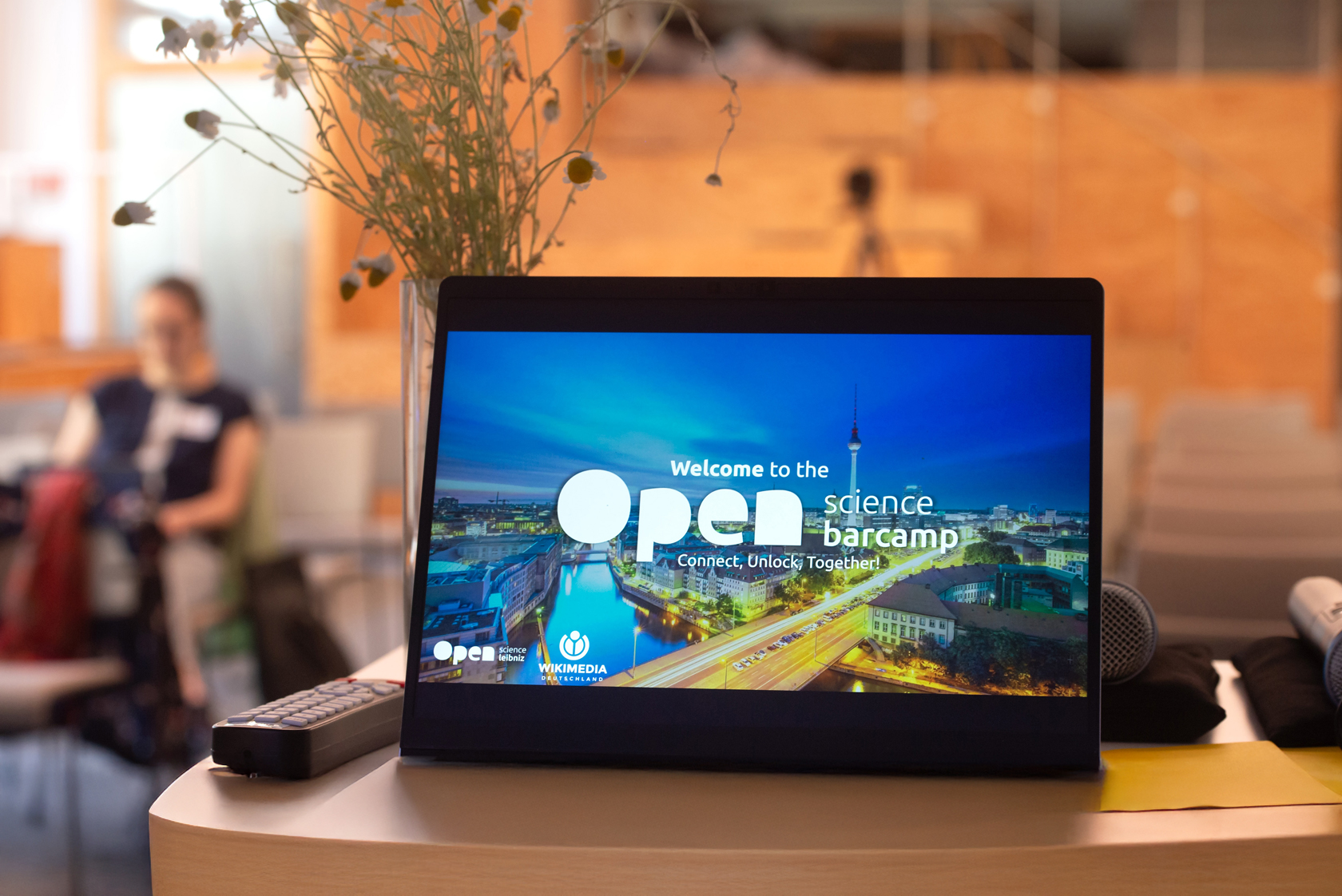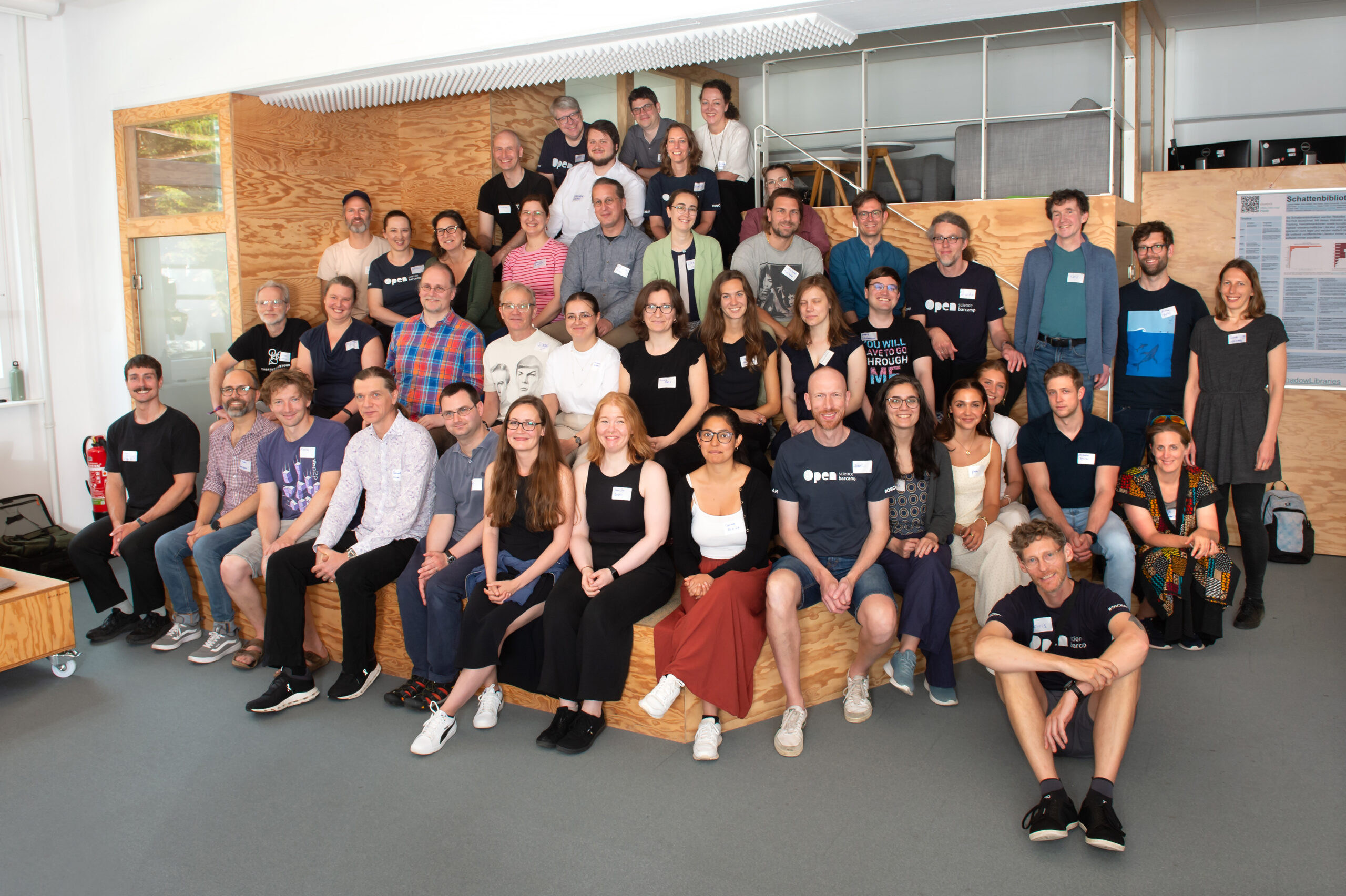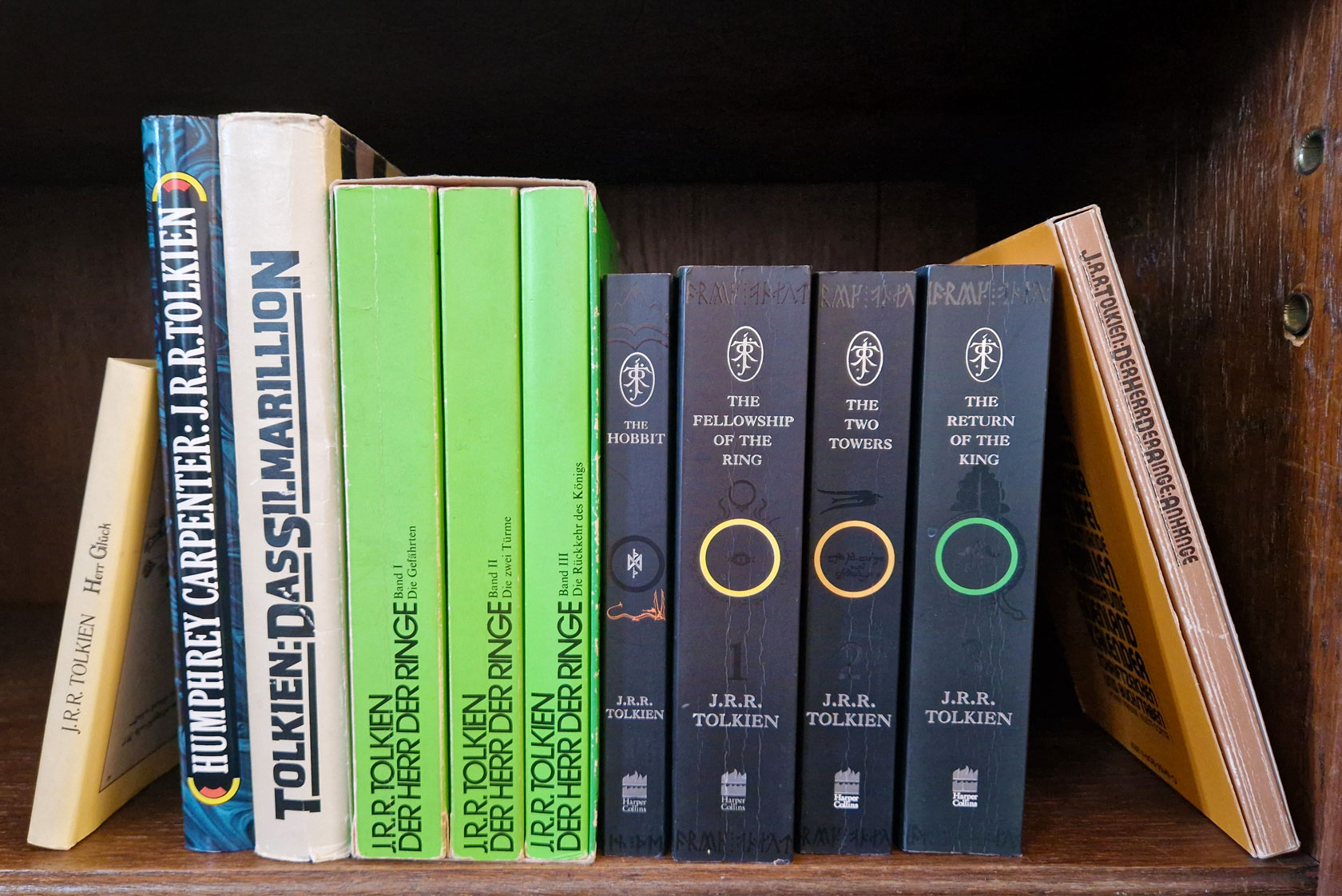
Barcamp Open Science 2025: From Threats to Collective Resilience
Safeguarding research and protecting knowledge infrastructures from political, digital, and structural threats was among the topics of this year’s Barcamp Open Science in Berlin. Other sessions revolved for instance around shadow libraries, the underuse of research data management infrastructure and the question whether projects dealing with data management like EOSC and NFDI have “gentrified” the discourse on Open Science. The participants also performed interesting mind experiments and shared their Open Science success stories.
by Susann Auer, Julien Colomb, Maaike Duine, Lambert Heller, Ilona Lipp, Tilo Mathes, Daniel Nüst, Guido Scherp, Katharina B. Schmitt and Christopher Schwarzkopf
The Barcamp Open Science 2025 brought together dedicated minds from diverse backgrounds to discuss current developments and challenges of Open Science. The importance of collaborating and joining forces when dealing with current threats to open knowledge were stressed by Wikimedia’s Head of Community & Engagement, Nina Leseberg, in her welcoming words for the 11th Barcamp Open Science. On 18 June 2025, 45 participants from all over Germany and beyond came together in Wikimedia´s Berlin spaces. To get to know each other (better), to share inspiring ideas and to gain new perspectives on all things relevant to Open Science.
In his ignition talk, “On the Value of Being Unorthodox: Resilience in a Time of Hostility against Arts and Sciences”, Henrik Schönemann (Humboldt University of Berlin) also spoke of the current threats to science in general, and Open Science specifically. Henrik predominantly shed some light on recent developments in the USA. He started out with some bleak observations and forecasts, how science is not only threatened by governmental attacks on specific research topics or by funding cuts and restrictions, but also by cyberattacks and (natural) disasters. He continued on how insidious actors are trying to undermine Open Science principles and concepts. An example is the recently issued executive order: “Restoring gold standard science”, by the White House, in which Open Science practices are applied counterproductively and science is politicised.
Luckily it was not all doom and gloom in Henrik’s talk. Projects like Data Rescue Project and initiatives like Safeguarding Research & Culture to rescue data and safeguard research are being established which show the resilience of Open Science communities. Or, as Henrik stated: That’s the value of being unorthodox! You can find Henrik’s slides here.
As in previous years, it has become a valued tradition for some session contributors to share their insights in a joint blog post, including critical perspectives on the current state of Open Science and new, inspiring Open Science success stories from practice.
Mind experiment: building a case against
Open Science (to learn from it)
by Ilona Lipp
Many of us operate within a bubble of Open Science advocates, and direct debates with critics are rare. The goal of this session was to take a step back and question our own beliefs and agenda. Such a change in perspective can help uncover potential risks and unintended consequences of Open Science, and thus to prioritise efforts and improve implementation strategies.
We began with a mind game: each participant thought of one argument against doing or promoting Open Science. Based on similarities, groups formed and developed “horror scenarios” about what could go wrong. These included total information overload and lack of quality control, fake research destroying the scientific community, powerful individuals deciding what counts as science, Open Data being used for the creation of automated weapons, and the collapse of innovation due to all resources going into implementing Open Science.
Next, each group identified one realistic concern based on their horror scenario: early-career researchers being predominantly occupied with data management; the dual use potential of Open Data and software; lack of motivation and resources needed to practice Open Science effectively; high entry barriers to digital research and the growing dependence on large commercial publishers; and the overwhelming volume of open outputs making it hard to identify high-quality work.
Groups briefly brainstormed mitigation strategies. Suggestions included increased support for early-career researchers, changes in research assessment and the development of barrier-free community-controlled tools and training. Further discussion of these strategies would be beneficial, maybe on the next Barcamp!?
Putting Open Science on the map:
Geospatial metadata in scholarly communication
by Daniel Nüst
Geospatial metadata has the power to connect knowledge across disciplines. Imagine being able to ask: Which areas were covered by a measurement campaign for a research paper? Where were participants in a social sciences study interviewed? However, current academic publishing infrastructure doesn’t support this type of metadata. Research contributions are rarely linked to geographic information in a way that is easy to use or search.
This Barcamp session explored possibilities of geospatial metadata. The session proposer Daniel introduced geoMetadata, an OJS plugin, and OPTIMAP, a discovery website. With these starting points, participants proposed ideas such as using large language models to extract location references from text and pulling coordinates from linked datasets, because assisting researchers in the creation of metadata was seen as crucial. And filling the OPTIMAP automatically is vital to make the case for geospatial metadata. New interaction paradigms, like scribbling on an interactive map, were invented on the spot. The group discussed ways to fill the map, including cited physical samples or data sets with known locations and extracting place names from tags, keywords or full texts.
The benefits of mapped articles could be greatest for disciplines that don’t typically think in terms of maps or coordinates, as it can help reveal new and surprising research connections. GeoMetadata can enable new use cases, such as finding Citizen Science projects based on users’ locations, and serve as a basis for metascience to advance research equity using a global, well-understood, unconfusing, undisputed, and language-agnostic reference frame.
Daniel extends his thanks to all participants for their thoughtful questions and ideas. The conversation highlighted the need for user-friendly tools to share and explore geospatial metadata. The session reinforced that while the core concept is broadly supported, it needs clear value propositions and real-world examples to reach communities and disciplines beyond the traditional geospatial domain.
(Find an extended report here.)
Open Research Data Management Infrastructure:
Building the backbone of Open Science
by Tilo Mathes
This session addressed the underuse of research data management (RDM) infrastructure and strategies to tackle adoption and sustainability challenges. Despite the availability of Open Source solutions to enhance data FAIRness (Findable, Accessible, Interoperable, Reusable), researchers often prefer familiar, proprietary, yet suboptimal tools due to practical and cultural barriers.
Key Discussion Points:
- Adoption Challenges: Researchers face steep learning curves, switching costs, and lack of workflow integration. Network effects influence adoption, as tools are more likely to be used if collaborators do so. Senior researchers may resist change due to entrenched habits and data ownership concepts, not promoting FAIR tools to younger colleagues who would be more open to adoption.
- Incentives and Motivation: Publication incentives remain the strongest motivators. Data journals are more valued than repositories like Zenodo, despite both making data citable. Success stories and narratives about RDM tool benefits can drive cultural change.
- Sustainability: Many Open Source RDM tools, initially funded by grants, struggle with ongoing maintenance funding. Sustainable models include building modular tools that extend existing platforms, integrating into ecosystems, and advocating for dedicated maintenance funding through policy actions or independent funders.
- Recommendations: Target leadership in organisations and support stepwise adoption. Demonstrate ease of use, existing solutions, and workflow extensions rather than new solutions. Encourage top-down policy support and bottom-up community building.
Conclusion: Technical solutions alone are insufficient. Widespread FAIR data practice adoption requires addressing practical, cultural, incentive, and sustainability challenges together. The session revisited persistent issues, shared experiences, and emphasised the importance of ongoing dialogue and incremental progress.
Success stories from Open Science practices
by Susann Auer
In this session we collected, for the third year in a row now, success stories of people whom it had helped to work in the spirit of Open Science and who got tangible and measurable benefits from doing so. The idea behind this story collection is to get ammunition for testimonials, anecdotal evidence and real world examples of how embracing Open Science skills drives people’s careers and offers opportunities that wouldn’t have been there otherwise. Feel free to use this as inspiration to persuade sceptics and get your colleagues on board of the Open Science train!
Here are some success examples that were shared in 2025 by the audience:
- Career-boosting: learning coding skills as a linguist within open communities such as the carpentries greatly increases employability within and outside academia.
- Embracing the mindset of sharing and collaboration worldwide with the help of social platforms helped to build a career of the individual; they gained the institution prestige and the individual gained trust from superiors which led to more freedom in their work.
- Development of MERIT app by QUEST Berlin as helpful tool for responsible assessment of researchers by institutions during recruiting and for search committees; helps to reward and employ individuals that are active in the Open Science sphere.
- Openness of research and tools build with R as driver for quicker innovations and more research ideas: due to the nature of openness of these resources, new research ideas can be created much quicker and fields can develop and innovate faster.
- Citizen science projects that include communication strategies that ask citizens: how can we help you, what do you need? Two examples were shared where this approach led to empowerment of students to create their own survey and empowerment of a community that is now actively saving water as individuals now better understand detrimental effects of not doing so .
Conclusions: This session was a wonderful mixed bag of people coming from various career stages and backgrounds and working on very different projects in various fields. The common thread of this year was that openness is the key. Openness allows for freedom – to pick what you want to learn or work on next, a better understanding of complex topics and quicker creative solutions to complex problems. The individuals that shared this year’s stories who all embrace an Open Science mindset seem to be able to gain more satisfaction out of their work and think they may benefit from a better employability due to their specific skills.
How to document projects to facilitate collaborative working
by Julien Colomb
In this session, we discussed what makes a good documentation. Most people present had experience in Open Source software development. We first discussed tools and formats for the documentation, from whiteboards for brainstorming until code comments, the documentation can have different forms. Considering that in many cases any documentation would be better than what is existent, we discussed how checklists can be used as a first entry point.
Two interesting points I did not expect came during the discussion. First, we talked about the need for better user experience for software, and a need for better documentation of corresponding design choices in the software frontend (or in the hardware interface). Second, we spoke about information not going into the documentation, how important it is to have a look at past “unofficial” communication to get a feeling of the community. Therefore, it seems important to have a place for this kind of communication (Mattermost, Zulip,…), and make it clear in the documentation how to enter that space.
EOSC & NFDI – Open Science gentrified?
by Julien Colomb
In this session, we discussed how the importance of projects dealing with data management have “gentrified” the discourse on Open Science. While these projects brought a professionalisation of the field (giving the opportunity for Open Science enthusiasts to have a job), it also modified the atmosphere in the community. We were wondering how this modified our own relation to Open Science, and whether the “Open Data” field did not grow too much in comparison to other topics, and what we could do about it, especially in a time where AI has become so fancy. We were quite split between people seeing the good side of these developments and those who were a bit nostalgic of the old times.
In the origin of the movement, Open Science events were rare and encompassed all aspects of Open Science (Open Access, Open Data, Open Code, inclusion and equity, Open Education, and so on, as we can see in the modules foreseen for the Open Science MOOC created around 2013). Nowadays, specific topics, like Open Access, have their own conferences such that these topics do not show in the Barcamp Open Science. It seems that this year’s barcamp participants are mostly working in the research data management field, mostly because that is where the money is given with programmes like the European Open Science Cloud (EOSC) and the German National Research Data Infrastructure (NFDI).
This seems to modify the atmosphere of the Open Science events, some of them becoming Open Data/data management events where the “science” and community aspects are forgotten (but the title stayed). With the attack on DEI (Diversity, Equity, and Inclusion) aspects in the USA, we have also seen both programmes abandoning their DEI positions and some strengthening them (mostly programmes outside the USA). Will the social component of the movement come back into Open Science events, or will they need their own events?
Opening the AI Data
by Katharina B. Schmitt
The topic of this session was the challenges that arise for science in relation to AI models and systems that are to be published. The EU AI law states that research is excluded from the scope of the law if created AI is only used for internal research, but there is no provision for the use of such after publication. The question of what happens to the data (the AI models) after they are published leaves researchers in the dark for the time being: should they be treated as industrial models from the outset or are they still just research results?
In the session we exchanged views on how AI is currently handled in different research institutions and what the possible approaches could be with regard to publishing AI data.
We discussed the excessive collection of data through scraping and the fear of losing control over one’s own published research data.
The final points were to seek legal advice on the creation of AI data and models. Publish the AI models with metadata and transparent descriptions under licenses. There is a need for repositories that also support AI models publishing.
Shadow libraries – ongoing educational collaboration,
exciting next steps, and urgent new questions
by Lambert Heller
The starting point of this session was a new educational material about shadow libraries, this poster (for now only in German, unfortunately). Actually, this poster resulted from last year’s Barcamp Open Science session about the same topic. Following up from that, a core group of four colleagues from all over Germany met almost every month virtually, eventually coming up with the poster, which subsequently had been accepted to the official BiblioCon 2025 poster session. There’s more long-term commitment and structure to some OSciBar sessions than we sometimes might expect! 😉
First, Lambert quickly introduced the approach of the poster, and some of its main statements. Both the coverage as well as the usage of shadow libraries worldwide are much higher than most might expect – more than a billion papers downloaded per year from Sci-Hub – even taking into account automated mass downloads, since they come from 80 million different IP addresses.
And also, there are so many different hurdles which are avoided by using these illegal websites, much more than just directly avoiding having to pay – see the poster’s abstract box.
The eight session participants agreed on goals for this session:
- What are interesting questions about shadow libraries we can’t answer (yet)?
- Since the work on the poster will be continued after the summer break of 2025: finding out, who is willing to contribute, for instance ironing out mistakes, adding references (including a Zotero group library even?), easier language and translations on a website version of the paper, tracking new and answered research questions on a corresponding Wikiversity page etc.?
- Turns out: half of the barcamp session participants spontaneously committed to make contributions, yeah!
The perhaps most fascinating thing was done by OSciBar participant Henrik Schönemann, who immediately set up a Codeberg git repository of the poster, in order to support translations and other cases of enrichment or reuse. We are more than grateful, what a nice move. Thank you so much, Henrik!
Regarding the research questions coming up during the barcamp session – it’s just a bit too much to expand this here, we will start another article on some other blog soon – please stay tuned!
Openness is not enough
In his closing remarks, Christopher Schwarzkopf from Wikimedia Deutschland’s “Marginalised Knowledge” team emphasised that openness alone is not enough if we fail to address the exclusions embedded in our knowledge systems. Open Science, he argued, must actively work to amplify marginalised voices, decolonise knowledge structures, and protect those who speak truth in the face of adversity. He reminded participants that Wikimedia’s mission is grounded in the idea that knowledge is a public good – and that achieving knowledge equity means asking whose knowledge counts, whose voices are heard, and who is still left out.True progress in Open Science requires collective effort: building bridges between disciplines and communities, challenging norms that exclude, and ensuring that science is not a silo, but part of shared and accessible commons.

This might also interest you – several blogposts for the topic “Open Science Barcamp“.
Dr Susann Auer is a plant scientist at TU Dresden and gives workshops in reproducibility in research with the community-led initiative Reproducibility for Everyone. She is a member of the steering committee of the German Reproducibility Network (GRN) which works to increase trustworthiness and transparency in science. You can find her on LinkedIn and Mastodon.
Julien Colomb is a former neurogeneticist (10 years of research on fruit fly memory and behaviour). He has been exploiting his interest in open research, working on reproducible data analysis and research data management. He has been working on ways (technical and social) to implement the principles of FAIR and Open Data in the lab workflow and ways to foster collaboration between researchers, notably through the GIN-Tonic projects. Most recently, he moved to the TU Berlin to work full time on FAIR, open source research Hardware and local, urban manufacturing projects. This combines his interest in project management inside collaborative research projects and social questions, using data science techniques. You can find him on Mastodon.
Maaike Duine works at the Open Research Office Berlin on the BUA Open Science Magnifiers project, in which she works together with various communities to develop Open Science indicators and visualisations for Open Science monitoring purposes.
As a social scientist and academic librarian, Lambert Heller founded the Open Science Lab (OSL) at TIB – Leibniz Information Centre for Science and Technology in 2013. With NFDI4culture (German), Open Research Information and contract or grant-funded projects, the OSL helps communities in science and culture to adopt open digital tools and practices. He can also be found on LinkedIn and Mastodon.
Ilona Lipp is the Open Science Officer at the University of Leipzig and a Freelance trainer and coach, helping scientists navigate academia and optimise their research practices. You can contact her on LinkedIn.
Tilo Mathes currently works as Product Manager and Open Source Lead at ResearchSpace, where he supports the team to develop the research data management solution RSpace and the open-source community around it. He can be found on LinkedIn, Bluesky, and Mastodon.
Daniel Nüst is a research software engineer and postdoctoral researcher at the Chair of Geoinformatics, TU Dresden, Germany. He develops tools and infrastructures for FAIR, open, and reproducible geoscientific research, and advocates for Open Science in the projects NFDI4Earth, KOMET, and CODECHECK. He can also by found on ORCID.
Guido Scherp is head of the “OpenScienceTransfer” department at the ZBW – Leibniz Information Centre for Economics. He can also be found on LinkedIn and Mastodon.
Katharina B. Schmitt is an occupational psychologist and data steward. She works as a research data manager at the Leibniz Institute for Agricultural Engineering and Bioeconomy (ATB) in Potsdam, Germany. Her work involves developing data management tools and guidelines for compliant data handling, with a special focus on FAIR data and Open Science. She is a member of the AI Awareness Team at the ATB. You can contact her on LinkedIn.
Christopher Schwarzkopf is Project Manager “Marginalised Knowledge” at Wikimedia Germany. You can find him on LinkedIn.
All photos: Bettina Ausserhofer©
View Comments

Gollum Effect Harms Research: Why Open Science Could Help Solve the Problem
Possessive and territorial behaviours of researchers are impeding collaboration and...



